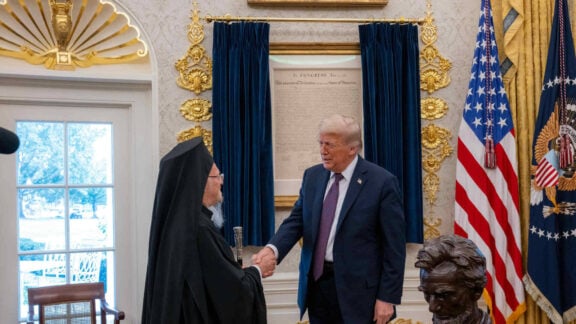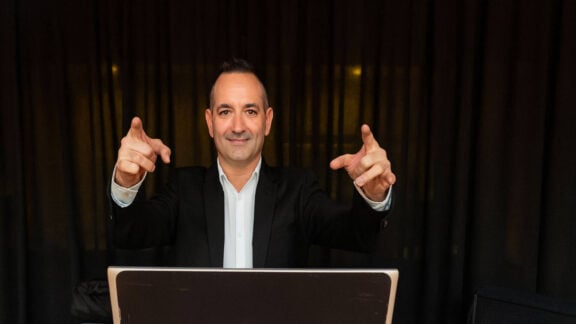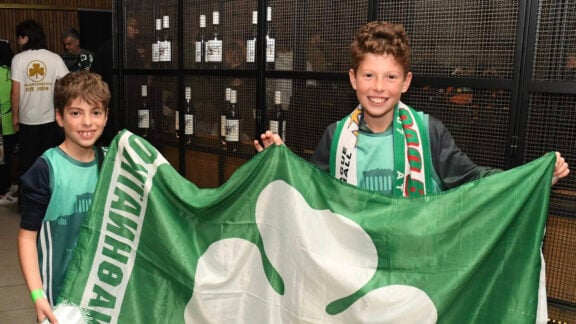After the Neo Classical period in the 17th Century the alchemical marriage between the Arts and Science was deemed a sordid affair.
“The real maths emerges in a speech by the Jew using the tattoed number on his arm as a meditation for survival.”
– Tom Petsinis
Like the Church spat on Galileo for his apparent lunacy, it would take generations of academics to march through time to champion science as the new great white light. Thereby turning the tables entirely, with the high priests of science eventually spitting on the lunacy of those they saw foolish enough to believe in God.
So, one could wonder if the science academy in its own ‘religious’ fervour to consolidate its own identity may have also mistaken that blind faith in a bearded man in the clouds with simple human flights of creativity.
Of course we now confess to this terrible tragedy when we hear Einstein was more of a shaman rather than a logician who spent most of his time ‘dreaming’ rather than ‘thinking’, or we pine for those good old days when the restrictive university ‘think-tanks of specialisation’ were unheard of and the boundless nature of the Renaissance Man could happily roam free.
The bi-product of this new perspective can be seen in the likes of Tom Petsinis, mathematics lecturer and poet/playwright.
You can see it in his face, between an impish smile and a snake charmer’s gaze, the recent realignment of the Arts and Science, for him, is really quite fabulous and this new freedom of expression can at last be given the respect it deserves. Petsinis has had a number of his plays produced, and poems published; his most noted work being a novel, The French Mathematician. Next week he has a new play, Salonicka Bound opening at La Mama theatre in Melbourne.
It is set in Thessalonica during WWII around a nightclub run by a Greek and a Jew. “Thessalonica at that time” he said, “was a truly multicultural city, a point of confluence of many civilizations. The Greeks, the Romans and of course the Ottoman Empire.”
So, how did the Jews appear in this mix, I asked. “During the Spanish Inquisition when the Jews were being persecuted, the Turkish Sultan invited them to settle in Thessalonica because of their skills in trading and the crafts.”The Ottoman Empire has got a lot bad press, but in fact they were quite tolerant with the different cultures they colonised. “Most certainly”, said Petsinis, “as long as you paid your taxes, anyone was free practice their given religion.”
The main cut and thrust of Salonika Bound is when a talented Jewish singer is invited to sing at the nightclub. A triangle appears when both the Greek and Jew fall in love with her. Jealousies ensue, and then the Greek sees his opportunity and betrays his Jewish colleague to the Nazis. The Jew is ushered away to Poland for apparent resettlement in a ‘new Jewish state’ and the Greek gets the girl entirely to himself.
I asked if the play is entirely set during this time. “It actually starts in Melbourne. The Jew survives the camps and emigrates to Australia, as does the Greek, and it is in Melbourne where their histories re-meet. The story also fluctuates between the children of the protagonists and the time of the betrayal.”
Stylistically Petsinis has used the famous Greek Rebetika music to colour the tragedy of this story. “As well as a use of the Jewish musical ballad” said Petsinis “and in-between the text there is choral like element in the show of two cultures singing their songs of lament.”
As Petsinis spoke of the story’s elements one got the idea there was a mathematical structure to the play, particularly in regards to the love triangle and the realignment of different histories. “The real maths”, said Petsinis enthusiastically, “emerges in a speech by the Jew using the tattooed number on his arm as a meditation for survival: the rhythm of numbers is quite deliberately infused into the language.”
The betrayal of the Jews is well documented throughout Europe, but hardly heard of in Greece.
“This is a secret part of our history, said Petsinis. There were though in the 50’s, trials of Greek colluding with the Nazis.” So with the use of the once oppressed Rebetika music, now celebrated by all of Greece, and a forgotten history of the Greek Jews, Salonika Bound ιs a show marked to see.





